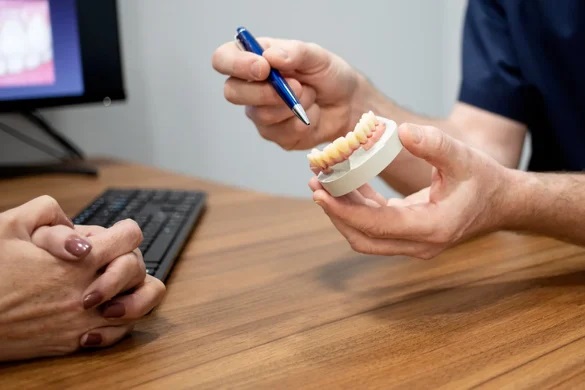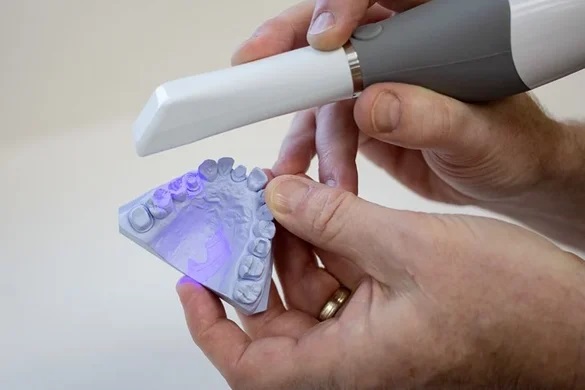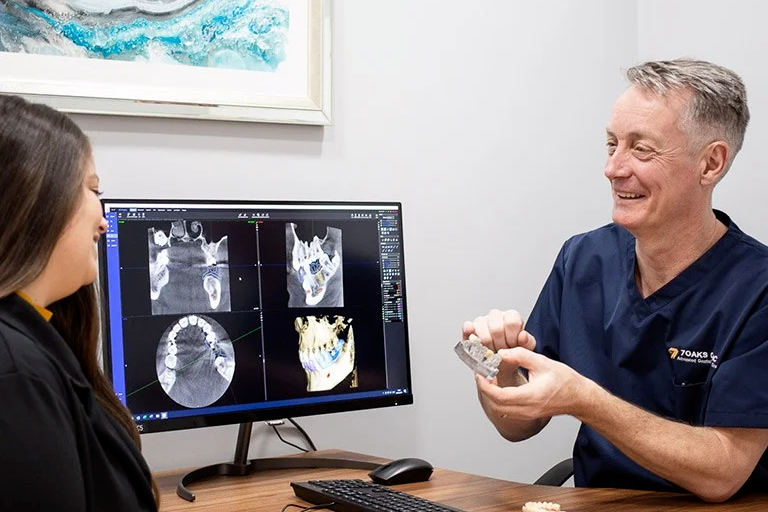
7oaks Clinic Blog features news and industry insight around dental implants and dental implant technology

Published by 7oaksclinic blog on 01 November 2021 12:18 pm
The National Dental Epidemiology Programme 2017/18 shows the regularity with which people missing teeth ask the question: dentures or dental implants? It showed that people with missing teeth often choose dentures. In fact, 15 percent of adults attending dental practices in England wore partial or complete dentures, in comparison to the 9.9 percent of adults who had fixed replacements for missing teeth i.e. either a bridge or dental implant treatment. And even though these statistics show the prevalence of these dental treatments, they provide no clarity on which treatment you should consider.
In this article, we aim to provide further guidance, with facts and statistics, to show what people should consider when making the choice between dentures and dental implants, whilst making reference to durability, maintenance, wearing experience, and cost. If you are new to dentures, bridges and dental implants as dental treatments, read our introduction article first: What Option is Best for a Missing Tooth?
As with all health decisions, this article is a source of general advice on dental procedures – you should always make a choice based on your particular needs, in consultation with your healthcare practitioners.

Durability is often highlighted as the main difference between dental implants and dentures. It is important to remember that no dental treatment is permanent, in the same way that natural teeth can be lost with poor dental care or when accidents occur.
Yet, dental implants are regarded as the most direct replacement for natural teeth due to their ability to last for a lifetime if well taken care of, compared to dentures that can last for up to 10 years. Even though they don’t always work as a lifelong solution, a 10-year duration period for a set of dentures is likely not to be a problem for most people. Instead, the accompanying factors for dentures’ shorter duration, such as their effect on the user’s jaw structure and need for maintenance, may be bigger obstacles to their use.
When considering overall lifetime and durability, dental implants surpass dentures as they work as the best direct replacement for natural teeth. However, if you are content with a shorter term solution for your dental health, then dentures may be a consideration that provides an adequate experience.
Maintenance refers to the practices necessary to keep dental implants and dentures usable and effective over time, as well as the process of cleaning them.
In the national dental survey, approximately 18% of the people wearing dentures and attending dental practices in England needed their dentures repaired or replaced. In other words, one in five people with dentures had to have corrective procedures to maintain their effectiveness at the time of the survey.
In comparison, dental implants do not need any exceptional repair or replacement procedures beyond the routine you would normally use to care for your natural teeth. This also applies to the cleaning of dental implants.

Dentures require a more elaborate cleaning process. To maintain their healthy appearance, dentures need to be cleaned with a soft brush after use and then soaked in a denture-cleaning solution to kill any bacteria. In addition, once removed for the night, it is important that they are kept moist, normally by soaking them in water, so they retain their shape.
These additional processes are required to keep dentures functioning and may not solve all the issues that people associate with having missing teeth in comparison to implant treatments, even if they work as a substitute.
Wearing experience is one of the more important factors to consider in your choice between dental implants and dentures.
The different types of dentures, which can be simplified into partial or full dentures, are associated with several common side effects. This includes an initial difficulty with eating and speaking, which is usually overcome with time and may require someone with dentures to eat softer foods during the adjustment phase. All dentures are also prone to becoming worn and loose over time and with greater use. This can be fixed with dentist appointments, but if ignored can lead to gum irritation which will affect the wearing experience as well as your overall dental health.
Partial dentures can also irritate gums because there is a higher risk of bacteria accumulation between the denture and the neighbouring teeth. While for full upper or lower dentures, the lack of teeth roots in the jaw bone naturally leads to a noticeable shrinkage of the jaw and the recession of the gums. After several years, the effects of jaw shrinkage will become visible in one’s mouth and overall facial structure.
In contrast, dental implants do not provide a wearing experience that differs from that of natural teeth, which highlights the functional difference between the two options. Dental implants can work as a one-time solution that delivers the normal experience of eating, speaking, and maintaining natural teeth. Moreover, they importantly retain your natural jaw structure because they are rooted in the jaw bone.
Cost often acts as the main constraining factor in the decision between dentures and dental implants. As an NHS treatment, full and partial dentures classify as band 3 treatments costing £282.80 (at the time of writing) and their repair is free. The only additional charge, excluding the replacement of dentures, is for relining dentures when they become loose to improve their fit – a band 2 treatment costing £65.20. Dentures are also available privately, which usually involves a treatment carried out with more time and better materials. The estimated average cost of private dentures is approximately £500 with a denture relining cost around £100 – depending on the practice and other factors like materials used and time taken.
The average cost of a single tooth implant was £2,415, according to the Association of Dental Implantology. However, our single tooth dental implant is well below the average single implant cost at £1595 for a complete treatment, and £3440 for three teeth replacements supported by two implants. All the fees for our services can be found here.
There are situations where dentures are recommendable over dental implants. The dental survey showed that the percentage of over 75 year olds using full or partial dentures was high (45%). In addition, the percentage of over 75 year olds with missing back teeth and no replacements was approximately 90%. This reveals a substantial overlap where over 70% of over 75 year olds with dentures have lost additional teeth after their initial denture treatment. This serves as an argument for over 75 year olds using dentures because these additional lost teeth can be easily replaced with each new set of dentures every few years.

However, we believe that dental implants are the optimal solution for missing teeth, and for most people. They are more effective as a dental treatment when considered against durability, maintenance, and wearing experience.
The national dental survey showed that in the age group of 45 to 64 years olds dental treatments for missing teeth were equally shared across dental implants and dentures. And for age groups under 45, dental implants are considerably preferred to dentures. This fosters a new conclusion where dental implants are the preferred dental treatment of choice for people under 64, even though the prevalence of dentures amongst people over 75 means that dentures are more common overall.
For people in this age group who are deterred from dental implants by their higher cost, you can seek information into the cost of your personalised dental implant treatment via our free consultation. This will allow you to make a true comparison between the long-term cost of replacing and repairing dentures every few years against the one-time dental implants procedure.
Most importantly, dental implants provide an effective solution in restoring your dental health to its original state, for people in this age range and younger with a few missing teeth. But for people who have lost many teeth, you should consider whether dentures resolve your underlying dental problems. Recurring dental issues are all signs that a more permanent dental solution is needed as has been the case with previous clients.
We provide additional, no-pressure counsel on how dental implants can restore your dental health once you book a Free Consultation with us.